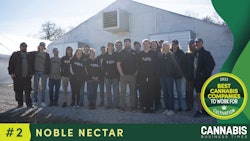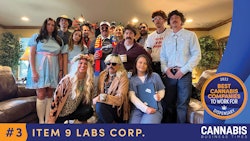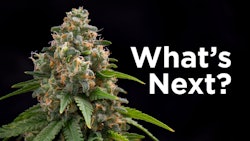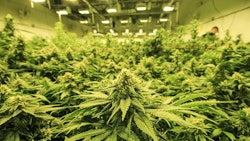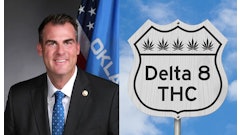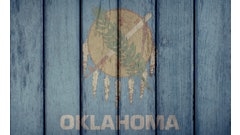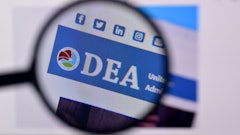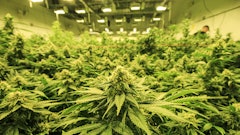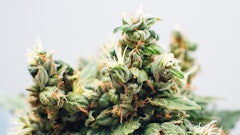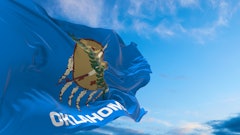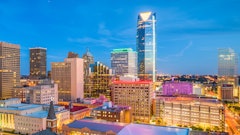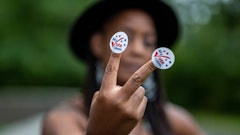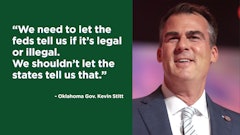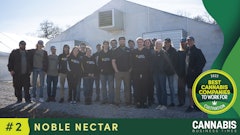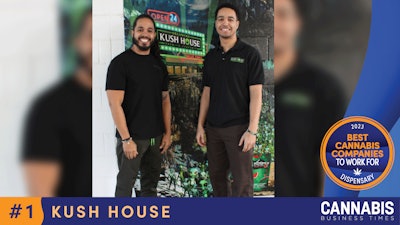
Frank Baker, co-owner of Oklahoma-based medical cannabis dispensary Kush House, and Kris Miller, the store manager of the company’s Classen location, draw most of their inspiration from the hardworking, reliable team members that they work with on a daily basis.
The company’s management style is maintaining open lines of communication while working in the trenches alongside its employees, and at the root of it all is the belief that work should be enjoyable—so much so that it doesn’t even feel like work.
Here, Baker and Miller share what led them to the cannabis industry, the type of company culture they strive to create, and what makes Kush House an overall great place to work.
Editor's note: Presented by Cannabis Business Times in an as-told-to format. The company's leaders shared below information directly with CBT. Edited for length and clarity.
Melissa Schiller: Why cannabis?
Frank Baker: For me and [co-founder] Dan [Holcomb], it was pretty easy for us. We were a part of the medical entity for the Air Force and whenever we got out, we had years of customer service [experience]. We wanted to be able to serve patients, as well as educate them in regard to what cannabis is and get rid of that stigma on cannabis, to show people that it’s a true medicine, something that’s grown from this planet naturally, and it’s been utilized to help people in need. That was one thing that kind of drew us to this career field.
Kris Miller: For me, it was Dan and his family. I just initially started working here to help with family, but then I learned about a whole new world of medicine that didn't really exist in the same capacity as when I was living in Texas, which has nothing like that.
MS: What are some of the worst jobs you've ever had? And what are some lessons from those jobs that you were able to bring to your current company in your current roles?
FB: My last job, I worked in civil service—I was a part of my military unit. The worst thing about it was just sitting at a desk all day. I stayed there for five years, and the best thing it taught me was commitment, through good and bad. It taught me a lot of admin skills that were needed for this industry—structure, admin skills, and then also completion of tasks and different jobs.
KM: For me, it was probably working on roofs. It was really hard up there. It was a lot of fast-paced, hard work. That helped me with being able to really see other jobs. It's a lot easier to notice the fun parts about it, and [it’s] challenging mentally, versus all just physical labor. You get a better appreciation for air conditioning—a nice comfortable spot. And it's a lot more on your brain than your body. I like that.
MS: On the flip side of that, what are some of the best jobs you guys have had? And what are some lessons from those that you've been able to bring to your current roles?
FB: Best job I'd have to say was my time in the Air Force, just for the simple fact that it basically was a melting pot of cultures, different intellects, different perspectives on life. What was really cool is it was mission driven. It was able to bring men and women together from different dynamics, different backgrounds, and we were all able to accomplish a set of goals together, regardless of our personal differences or ideologies.
KM: And I've had a few different jobs, but this is definitely my favorite job. Nothing even comes close to working here for me.
MS: What's the best advice you have ever been given, and who told you that?
KM: Mine comes from my professional life, from Frank and Dan as owners and mentors, just about time management, follow through, getting things accomplished, and being able to control things, everything going on around me.
FB: For me, the best advice that was given was probably through a philosopher I listen to and that was find out something that you enjoy so much, it's like playing, and this is what this has kind of been like for me. It’s work, but it's not so stressful or burdening on me. The best advice is to go with your gut, follow your dreams, and really try to make that a reality. That's what me, Dan, and my wife were able to do with this business. We've always talked about cannabis and for us to sit together and really follow through with our dreams and what we believe in instead of listening to people was a cool thing. So, I would always pass that information on. Whatever you believe in that you want to do in life that brings you happiness—internal happiness—pursue it.
MS: What kind of culture do you try to create or foster at your company? Can you sum it up into two or three words?
KM: I'd say we try to cultivate a team-oriented culture. We focus on growth and on being a place where employees want to come to work and enjoy working. We have a focus on accountability, and just having a good team beside you that you can rely on and work well with, in all levels of the company.
FB: To sum it up, I'd say what a lot of our employees as well as patients say, [that] this is a very fun atmosphere. It's got a really good vibe, [a] fun atmosphere. Our patients, our budtenders, our employees are very passionate. And like Kris said, they're accountable. It's kind of like a barbershop. Patients can come in and reference our budtenders, which I think is very awesome, by a first-name basis and just want to see them.
MS: How would your employees describe your company culture?
FB: One of the things that me and Dan tried to instill [is] the same thing that the military taught us: open chain communication. We will never ask our employees to do something that we ourselves aren't doing. And I love to work. I love being able to own my own business and work alongside the lowest level budtender all the way up to our upper management, just to show them that everybody has to do this. I'm not only just putting this on you to do it. I'm going to pre-pack flower with you, I'm going to talk to patients with you, sell products with you. I'll clean bathrooms. I'll do every job that we have instilled in store with my people.
Dedicated, committed and passionate—that's always been our culture. Even when we do our interviews—it's me, Dan, [and] we're starting to teach Kris how to do interviews—but we take time to sit down and show people that one, we're appreciative of the time that they're looking to commit to our team. Me, Kris and our upper [management] team have created SOPs for them so they have all these educational resources and assets to rely on, and then [we] go through and show them how to actually utilize that and have an open forum of any questions or things that they don't understand. And then we even do hands-on training, to kind of alleviate any concerns or questions they may have.
MS: What are some ways that you actively promote or encourage positive team culture?
FB: At each one of our locations, we have goals that we put on each budtender. We allow them to have product sampling. So, anything new that we bring in, a lot of our suppliers, we have really good relationships with them, [and they] will give us samples to give to our budtenders so they can recommend them to patients. We have a budtender and a patient recommendation form of products that come in store, so they can recommend anything to myself, Kris, or any of our leads to bring in based upon their consumption outside of our store. Maybe they’ve seen something on a social platform like Weedmaps or Instagram that they think they would do well in store. So, open communication is the best thing. Our budtenders feel like they have the relationship to talk to us about anything good, bad or indifferent.
The days that they have off, they have an opportunity to make even more money and go out to our grow and help us with our trimming. They get to see what's coming down, so they get to articulate to patients on what's in the pipeline for flower coming down. They're able to see a lot of things before it actually hits the storefront and communicate that with patients, as well as be involved with bucking, trimming, stuff like that. They get their hands on everything that this industry has to offer.
MS: What do you think makes Kush House a great place to work overall?
FB: Everything. Obviously, we have a role to play in it, but looking at our storefront, we have different role players, from our leadership [and] management, to our staff, to our suppliers, and even to our patients. It's all encompassing. The reason why we're such a great place is because of all of that: our employees caring about their job, having the commitment to be here, the passion to show their patients great customer service, and understanding their products; suppliers working with us, giving us some of the best price points, [and] keeping us up to date with what they're doing to make an impact on patients; patients coming in to get to know our staff. They're keeping their loyalty with us from day one, making word of mouth recommendations, telling other people about us, or even giving a shout out from Weedmaps, Google, [and] all of our social platforms. It's really all of it, honestly. That's what makes us who we are, from all the way to the top, all the way to the bottom. We all come together and work together and just keep that bond.
MS: Where do you see Kush House in five years?
KM: I could see two or three more stores opening up, great expansion and growth and further development of house product lines and branding. Also, we’re coming up on our third year of being open, always open, never closed, 24/7, solidifying ourselves as the one true, always open, locally owned [dispensary] here.
MS: Where do you find your leadership inspiration?
FB: For me, it would just have to be the people I work with, honestly. My biggest inspiration is my business partner, Dan. He pushes me tremendously. I look at him like an older brother, but for him to have taken a chance with me and us to really go all in on this, he's my biggest inspiration. He believed in my potential, so I owe it to that guy to just see this thing through. [He] and my wife are my biggest support staff. And then [it’s] the people I work with. I'm inspired by coming in and trying to teach them to stick to their goals and their dreams and go through adversity, like the good, bad and indifferent—experience it all. And just be grateful that you're here and kind of reflect on where you started out at and where you are now. It's an inspiration to work for the company I'm working for. The group of people that I have around me is my inspiration.
KM: And for me, Frank and Dan are a lot of [my inspiration.] I saw firsthand how they could take an idea and turn it into a store, and from the store to one of the most popular in the area, to being [open] 24/7, to being multi-location. Now, having grown, it's just impressive. And every second, I'm trying to learn something, and they have a lot to teach.
MS: What's one quality that every employee has to have to work for Kush House?
FB: Committed and passionate, because it's a lot. You still have your personal life, so work life, personal life—you have to have a great balance. To come here day in and day out, you have to be passionate about this industry. You have to be passionate about customer service, and then you just have to be committed to the job. That’s one of our core values, is service before self. That was a core value that me and Dan took away from the military, from the Air Force. If I'm having a bad day, one of my priorities is coming in here and making somebody else's day awesome and amazing. And if I'm having a great day, then I'm trying to match that same energy for my patients coming in.
MS: What's your biggest business challenge right now? And how can individual team members can help contribute to overcoming that challenge?
FB: I'd say the biggest challenge is finding good workers, good employees. I wouldn't say we have a huge turnover, but when we have to hire, we have to find a good fit for our team. And how our team helps with that is having team input and showing them the ropes, SOPs, [and] teaching them about product knowledge.
KM: That's probably the biggest challenge, is finding dedicated, committed, passionate employees and making sure they're here for the right reasons.
MS: How has Kush House changed since it launched to meet the demands of the changing market in Oklahoma?
KM: We have never closed.
FB: That's it, that's the biggest thing, is we would open at like 9 or 10 o'clock, we would close at 10 o'clock, and then, right shortly before COVID hit, we had opened our doors 24/7. And that's been the model ever since: we're always here. We're always open for patients. That's something that me and Dan had seen, too, in our medical entity because our clinic wasn't open on the weekends. So, every Friday, we would have a line of people outside of our clinic. Patients need medicine. If they're truly in need of medicine, that medicine should never take off. So, that's one of the mentalities that we adopted with our business. We will always be open. So, that's how we've changed: we're here to serve our patients, even when our competitors want to take time off or take vacations. We're always here to make sure that the patients are happy.
MS: Which company other than you your own are you watching and why?
FB: I've always been fascinated with Chick-Fil-A. To go from being the worst drive-thru service and then turn that around and be one of the best customer service-oriented and fast [drive-thrus]—that's one thing that we did because [our] Moore [location] has drive-thru bays. Whenever we were building this location, me and Dan would go to restaurants and just see how people's customer service was, and I would literally time myself in the parking lot of Chick-Fil-A. I'd be car number 40, and I would get out of that line within four minutes, always. They have a lot of staff. They're super friendly. And I've never had anything incorrect when I go through Chick-Fil-A. My order’s always right. They're always polite. It's everything that I tried to shoot for in customer service. I pay attention to restaurants a lot. I do market research for products and stuff just to make sure that we're appropriately pricing, but my biggest thing is the food and beverage industries because that's true customer service to me.










